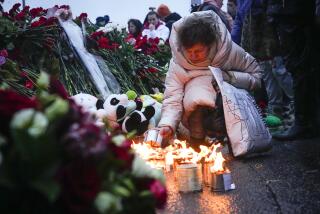International Business / The Pacific : Sri Lanka Vows to Shake Off Bombing--but Will Investors?
- Share via
COLOMBO, Sri Lanka — It’s not quite business as usual, but operations of the Sri Lankan Central Bank--ground zero in a devastating explosion just two weeks ago--have resumed from offices scattered around the city.
“The central bank will show the world by bouncing back that terrorism cannot win,” declared the bank’s governor, A.S. Jayawardana.
Whether overseas investors and tourists are as resilient as central bank employees is the question Sri Lankan business leaders are asking. Yet terrorism is sometimes part of the risk in countries seeking foreign investors to help privatize their economies.
The Jan. 31 explosion, which killed at least 81 people and injured nearly 1,400 others, took out several symbols of the commercial aspirations of this Indian Ocean island nation.
In an evident attempt to sever the sinews of the nation’s business and trade, suspected Tamil suicide guerrillas drove a truck laden with explosives into the central bank headquarters in the heart of the capital city’s financial district.
At least five buildings, including the bank, may have to be razed. Another--the offices of George Steuart & Co., one of Sri Lanka’s oldest conglomerates--took a massive hit as well.
The attack killed at least 40 bank employees and critically injured 150 others, Jayawardana said. The bank’s basement vault holds gold and millions of Sri Lankan rupees, as well as bodies still believed entombed in rubble.
A handful of U.S. Fortune 500 firms such as IBM and Union Carbide have been doing business for decades in this former British colony. More recent arrivals include Pizza Hut, which is already dishing up pies in a Colombo outlet, and Mobil, which lost out last year to Royal Dutch Shell in bidding on a state-held company that bottles and distributes liquefied petroleum gas.
But the ongoing civil war has driven the investment risks high. This was the second time in recent months that guerrillas had sought out an economic target in Colombo, which officials hope to make a regional center for banking, transshipment and other services in South Asia.
In October, a suicide squad set fire to storage tanks at a Colombo petroleum depot, claiming at least 20 lives and giving spectacular proof of their ability to hamstring Sri Lanka’s growth.
Last year, due in part to the war, direct foreign investment in Sri Lanka sank to about $33 million from $110 million; for the first nine months, there was a net outflow of investment from the Colombo exchange. The index fell by a full 33%.
But by autumn, there was an upturn of interest as President Chandrika Kumaratunga’s left-leaning People’s Alliance coalition fought the rebels with new energy and a privatization program designed to sell off state assets got under way in earnest.
Only a few weeks ago, A.C. Gunasinghe, chairman of the 650-member Ceylon Chamber of Commerce, told a reporter that his “gut feeling” was that 1996 would be a good year for Sri Lanka’s economy.
Kumaratunga’s government had hoped to raise $390 million through privatization of state-owned assets such as tea and rubber plantations, cement plants, textile mills, a piece of Sri Lankan Telecom and Air Lanka, the national carrier.
Ranil Wickremesinghe, a former prime minister and leader of the opposition United National Party, said the bombing meant it would take the island’s already war-sapped economy years to recover. Before the attack, the civil war was already expected to consume 10% of gross domestic product in ’96.
The economic impact of the bombing is still being tallied. But one economist at the semi-official Institute of Policy Studies has predicted the direct loss to the economy will reach $50 million to $75 million.
Further, according to his preliminary estimate, the country’s economic growth rate may be dented by a full percentage point, from 4.5% to 3.5%.
For some businesses and their employees, the losses are obvious. At the beachfront Ceylon Intercontinental, one of this seaside city’s finest hotels, the bomb blew in all windows in one wing and collapsed the ballroom ceiling on the top floor. Employees said they had been told the hotel would close for a year.
The dangers to the economically important tourism industry are obvious. Some countries, including Germany, the biggest provider of tourist traffic to this relatively inexpensive tropical island of pristine beaches, Buddhist monuments and cool green hills, had already warned their nationals to stay away.
The local investment community sought to portray the latest trouble as just a temporary setback.
“Short-term investor sentiment will be affected,” said Anura R. Wickremasinghe, chief executive of HDF Securities Ltd., a stock brokerage. “But the fact is that investors who know Sri Lanka and have viewed it as an investment opportunity would look at things in the long term.”
Even at HDF, however, there were voices much more pessimistic. “I think this bomb is merely going to increase the perceived political risk in Sri Lanka,” one broker said.
More to Read
Sign up for Essential California
The most important California stories and recommendations in your inbox every morning.
You may occasionally receive promotional content from the Los Angeles Times.













